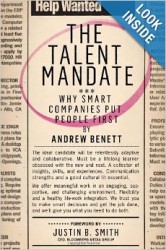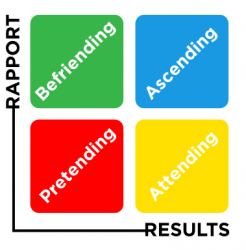The Talent Mandate: Why Smart Companies Put People First by Andrew Benett
I have learned that based on my own interests and daily work, I am eager to consume just about anything I can find related to talent management. When I got this review copy, I dove in and while it’s been a while coming, I finally had time to put together a review of this excellent resource.
Things I liked
- Show, don’t just tell.
 Stop saying, “People are our greatest asset!” and actually demonstrate how it’s true. Actions speak louder than words.
Stop saying, “People are our greatest asset!” and actually demonstrate how it’s true. Actions speak louder than words.
- Make culture a priority. “There is something strangely intangible about culture, something that can be felt but not always articulated.” In other words, culture is what happens when you are not looking. So how do you embed that into your organization? Codify what is important. Form a “Culture Corps” to define why people like working for the organization, what the organization and people aspire to be/achieve over time, and reinforce both.
- Always be asking three critical questions: is the culture grounded in values, does the culture promote cohesion, does the CEO make culture a top priority? If the answer to any of those is “no,” then you’re going to face difficulties in maintaining the best culture for the organization.
- Consider a “manager detox.” New managers at Rackspace are required to undergo a three day training to “un-learn” outside thinking to avoid polluting the new environment. We’ve all run into “that’s how we did it at my last job” situations, and many of those with questionable results. This process helps to overcome those potential conflicts.
- “Be comfortable with what you don’t know.” The best ideas come from a team, not just from a single executive. Every employee wants to make an impact, so give them a chance!
- Hiring for agility as a competency. This means looking for strong thinkers who can apply their knowledge to different types of business problems. Agile leaders focus first on big picture and then on how their piece will contribute to that. Dave Ulrich provides a model describing four types of agility: learning (curious, finds simplicity in complexity), people (self-aware, makes other succeed), change (likes to experiment), results (flexible in ideas, works well in teams). The bottom line: find someone with those traits and you’ll have an excellent example of an agile leader on your hands.
Final thoughts
If you’re also looking for ideas and tips on talent management, then I encourage you to check this book out. I think you’ll learn a few things, see some old concepts in a new light, and challenge yourself and your organization to be better at managing talent overall. The Talent Mandate is a great book. Click here if you would like your own copy.

 What is rapport, anyway? In short, it’s the interpersonal interactions that make up the overall communication health of the team. Do they get along? Do they interact well? Do things flow? Are there bottlenecks? What about gossip? Do people go beyond the basic required communication to keep each other in the loop and up to date? Do people hoard information or share freely?
What is rapport, anyway? In short, it’s the interpersonal interactions that make up the overall communication health of the team. Do they get along? Do they interact well? Do things flow? Are there bottlenecks? What about gossip? Do people go beyond the basic required communication to keep each other in the loop and up to date? Do people hoard information or share freely?